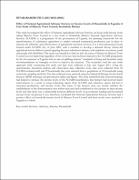| dc.description.abstract | BITAKARAMIRE PIUS (2011-M102-20015)
Effect of National Agricultural Advisory Services on Income Levels of Households in Uganda: A Case Study of Mateete Town Council, Sembabule District
This study investigated the effect of National Agricultural Advisory Services on house-hold income levels taking Mateete Town Council as a case study in Sembabule District. National Agricultural Advisory Services (NAADS) is a programme of the government of Uganda, the planning framework for the transformation of subsistence agriculture to market oriented commercial production, put in place to increase the efficiency and effectiveness of agricultural extension services. It is a semi-autonomous body formed under NAADS Act, of June 2001, with a mandate to develop a demand driven, farmer-led agricultural service delivery system targeting the poor subsistence farmers, with emphasis on women, youth and people with disabilities. The study was intended to find out why the status of farmers in Mateete Town Council was not improving regardless of lots of money that had been injected in the NAADS programme by the Government of Uganda with an aim of uplifting farmers‟ standards of living and thereafter make recommendations on strategies on how to improve the situation. The researcher used the case study approach while conducting this study and data were collected in July and August 2013. Using the questionnaire, document analysis and observation data collection tools, data were collected from 03 NAADS technical staff and 39 households that were selected from a population of 45 households using systematic sampling methods. The data collected were analysed using the Statistical Package for the Social Sciences (SPSS) technique and presented in tables and figures. The study established that received trainings had helped to increase the income levels of the NAADS beneficiaries; that farmers had received major achievements as a result of using technology inputs from NAADS and, therefore, inputs had led to increased productivity and income levels; that many of the farmers were not certain whether the establishment of the demonstration sites within their area had contributed to the increase in their income levels and that there was a relationship between different levels of government funding and household income levels. In general, it was, therefore, concluded that National Agricultural Advisory Services had a positive effect on household income levels in Mateete Town Council and these results were attached to Uganda as a whole.
Key words: Services, Advisory, Income, Household | en_US |


